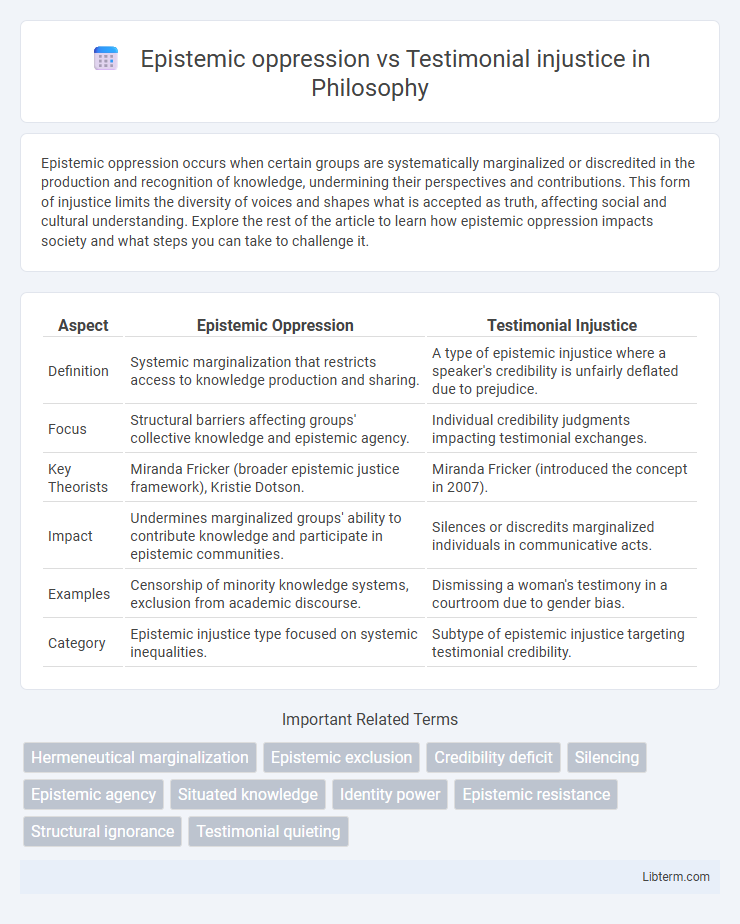Epistemic oppression occurs when certain groups are systematically marginalized or discredited in the production and recognition of knowledge, undermining their perspectives and contributions. This form of injustice limits the diversity of voices and shapes what is accepted as truth, affecting social and cultural understanding. Explore the rest of the article to learn how epistemic oppression impacts society and what steps you can take to challenge it.
Table of Comparison
| Aspect | Epistemic Oppression | Testimonial Injustice |
|---|---|---|
| Definition | Systemic marginalization that restricts access to knowledge production and sharing. | A type of epistemic injustice where a speaker's credibility is unfairly deflated due to prejudice. |
| Focus | Structural barriers affecting groups' collective knowledge and epistemic agency. | Individual credibility judgments impacting testimonial exchanges. |
| Key Theorists | Miranda Fricker (broader epistemic justice framework), Kristie Dotson. | Miranda Fricker (introduced the concept in 2007). |
| Impact | Undermines marginalized groups' ability to contribute knowledge and participate in epistemic communities. | Silences or discredits marginalized individuals in communicative acts. |
| Examples | Censorship of minority knowledge systems, exclusion from academic discourse. | Dismissing a woman's testimony in a courtroom due to gender bias. |
| Category | Epistemic injustice type focused on systemic inequalities. | Subtype of epistemic injustice targeting testimonial credibility. |
Defining Epistemic Oppression
Epistemic oppression refers to systemic harms that restrict marginalized groups from producing, sharing, or validating knowledge, often rooted in social power imbalances. It encompasses broader structural issues beyond individual interactions, affecting whose voices are heard and trusted within knowledge practices. Defining epistemic oppression involves recognizing both testimonial injustice--where a speaker's credibility is unfairly deflated--and hermeneutical injustice, which occurs when marginalized groups lack the resources to make sense of their experiences.
Understanding Testimonial Injustice
Testimonial injustice occurs when a speaker's credibility is unfairly deflated due to prejudice, causing their knowledge to be dismissed or undervalued. This form of injustice undermines the fairness of epistemic exchanges by marginalizing individuals based on social identity or status. Understanding testimonial injustice helps reveal how systemic biases distort the distribution of epistemic trust and contribute to broader epistemic oppression.
Origins and Theoretical Foundations
Epistemic oppression originates from systematic structures that marginalize certain groups' knowledge, rooted in feminist and critical race theories emphasizing power dynamics in knowledge production. Testimonial injustice, introduced by Miranda Fricker, specifically addresses the credibility deficit faced by individuals due to prejudice during testimony, grounded in epistemology and social epistemology examining trust and credibility. Both concepts intersect in highlighting the social embeddedness of epistemic practices but differ in scope, with epistemic oppression encompassing broader systemic issues beyond testimonial interactions.
Key Differences Between Epistemic Oppression and Testimonial Injustice
Epistemic oppression involves systemic barriers that prevent marginalized groups from participating fully in knowledge production, whereas testimonial injustice specifically refers to the unfair discounting of an individual's credibility in testimony due to prejudice. Epistemic oppression operates at a structural level affecting entire communities, while testimonial injustice occurs at an interpersonal level within specific interactions. The key difference lies in scope: epistemic oppression shapes knowledge systems and access broadly, whereas testimonial injustice targets individual acts of credibility deflation.
Mechanisms of Epistemic Exclusion
Epistemic oppression manifests through systemic mechanisms that exclude marginalized groups from knowledge production, often by undermining their credibility or silencing their testimonies. Testimonial injustice specifically involves prejudiced deflation of a speaker's credibility based on identity, resulting in a failure to acknowledge or value their knowledge contributions. Mechanisms of epistemic exclusion include social practices, institutional biases, and epistemic marginalization that collectively restrict access to epistemic authority and participation in collective knowledge processes.
Real-World Examples of Testimonial Injustice
Testimonial injustice occurs when a speaker's credibility is unfairly deflated due to prejudice, often targeting marginalized groups, exemplified by incidents where victims of sexual harassment are disbelieved or ignored based on gender biases. In real-world contexts, racial minorities frequently encounter testimonial injustice in judicial settings, where their testimonies are systematically distrusted compared to those of majority groups. Epistemic oppression encompasses a broader range of knowledge-based harms, but testimonial injustice specifically highlights the devaluation of individual testimonies rooted in social identity prejudice.
Intersectionality in Epistemic Injustice
Epistemic oppression manifests through systematic silencing and marginalization of knowledge produced by marginalized groups, while testimonial injustice specifically involves discrediting individuals' credibility based on prejudices. Intersectionality deepens epistemic injustice by highlighting how overlapping social identities--such as race, gender, and class--compound the impact on marginalized voices in knowledge production and validation. Understanding these intersecting axes reveals the multifaceted barriers that hinder equitable epistemic recognition and participation.
Consequences for Marginalized Groups
Epistemic oppression undermines marginalized groups by systematically excluding their knowledge systems, leading to widespread social invisibility and loss of cultural identity. Testimonial injustice specifically damages trust and credibility, resulting in reduced access to justice, healthcare, and political participation for these communities. Both forms of epistemic harm perpetuate structural inequalities by devaluing voices essential for inclusive decision-making and social recognition.
Strategies to Counter Epistemic Injustice
Strategies to counter epistemic injustice involve amplifying marginalized voices through inclusive dialogue and promoting epistemic humility among dominant groups to recognize and correct their biases. Establishing institutional reforms such as equitable knowledge validation practices and education on unconscious bias enhances testimonial credibility and reduces epistemic oppression. Encouraging community-based participatory research empowers oppressed groups to co-construct knowledge, directly addressing testimonial injustice and fostering epistemic justice.
Future Directions in Epistemic Research
Future directions in epistemic research emphasize developing frameworks that integrate insights from epistemic oppression and testimonial injustice to address the systemic exclusion of marginalized voices. Researchers aim to create more inclusive epistemic environments by exploring collaborative methodologies that validate diverse experiential knowledge and challenge dominant knowledge hierarchies. Advancements in intersectional epistemology and technology-driven participatory platforms hold potential for mitigating epistemic harms and fostering equitable knowledge production.
Epistemic oppression Infographic

 libterm.com
libterm.com